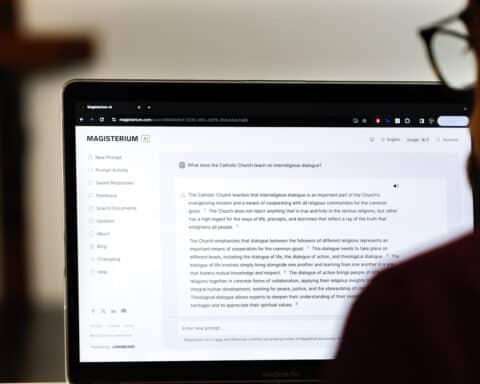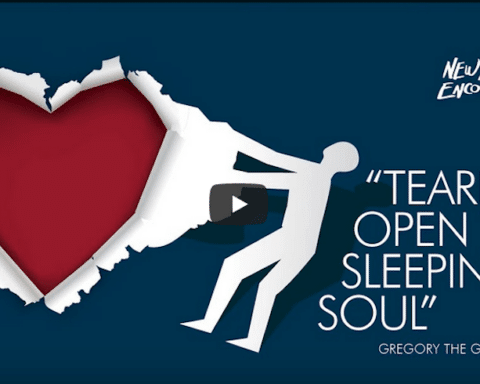A few weeks ago, my dearest friend texted to tell me she believed she was in the process of miscarrying. She was very early on in her sixth pregnancy to date, and this would be the third miscarriage. She wanted me to know so I could pray for her and hold vigil with her through the process. This dear friend is not one I can visit in a time like this — we are on opposite ends of this vast country — and so we pray for each other. Usually this type of union with friends suffices, but in recent years my desire for physical proximity to those whom I love has intensified.
Technological advances in transportation, video calling and even the now-seemingly-archaic email, have allowed for a transient way of life, one where pieces of your heart are left behind or taken with someone as they go. Formed and fostered community is broken into pieces in the shape of human bodies and the souls within that are strewn about the world.
We can do this now. We are able to adjust to being in one place in the world, establish ourselves, set down roots, make friends (who become family because you are likely far from your family) — only to yank up those roots to go to a new part of the world. And the cycle repeats itself. At least this is what I have found in my own life, moving from a small state, to a bigger state for college, to the bustle of New York post-grad, to Indiana for graduate school, and back again to that small state, which, as a wise woman told me before I returned, “will have a false familiarity. You’ll know the roads but you won’t know the people.”
The body communicates something
Upon what we hoped would be the final regional move of our lives, my husband and I found ourselves in good jobs in our field of work, the ability to purchase a lovely home in which we hoped to raise a family, and a parish just down the road with a great pastor and preacher. We looked forward to all this new town would bring into our lives, how our new work communities would become more like family, and mused about the other friends we would meet along the way. But the truth of the matter is, in one’s early 30s in a new place, it’s not the easiest thing to do — to make new friends. As Ben Rector puts it: “You can’t make old friends.” Gone are the days when a new family moves into town and everyone comes to meet them, bring them a meal, helps them get settled in the home, shows them the Church, and nurtures their children as their own.
Maybe it’s the raging extroversion that God bestowed on my character at birth, but I long for this. I wish our world was more interconnected and present in the form of bodies before me and not only texts or 1-second-delayed-faces on a screen. The body communicates something. The Trinitarian God revealed the fullness of truth through the taking on of human flesh through the motherly body of Mary. The fleshiness of being in the presence of a friend makes all the difference, especially when the challenge a friend faces is as bodily as miscarriage. I wanted to go to her house and make her some tea and snuggle up with her kiddos, so she could be present in her body with the new life she held for however briefly. But her being back in her hometown, with that same false familiarity, she, too, had no one to reach out to who wasn’t cross-country from her, who she really felt could hold the sorrow of miscarriage with her.

Spiritual closeness
In my angst about not being able to be close and minister to my friend, I reached out to yet another friend who is at a distance, this one in Europe. In his prayerful wisdom, he reminded me: “Even a great physical distance between friends doesn’t prevent spiritual closeness.” This wasn’t an earth-shattering reminder by any means, but instead of cynically disregarding this as a platitude, I really sat with it. Why is this spiritual closeness even possible? What is it about being human that is both fleshy and also not? And then I thought of Our Lord, who came to us in the flesh and left us the memorial of his body and blood as a means to be drawn into his marvelous light. And yet we aren’t physically present with him now. He promises this physical closeness at the end of all things, but here and now we live in tension. We know the Lord and his closeness already by his grace and especially the Eucharist, but also, not yet. Not in its fullness.
During the holiday season, we tend to think of the human beings whose bodies are not in close proximity to us. Those who we wish we could share in real-time laughter over the same pot of coffee or the same spiked nog. And yet when we can’t, when time or space or money or rift prevents us from being physically close to the ones we hold dear, we look to the manger and remember that this one changed the game. No technological advance will prevent us from the unifying love of Christ Jesus. And when we miss our friends and family who are far away, we are able to look to the Eucharist in thanksgiving for the love we share, because he first loved us. And together we can dwell with the body of a friend who unites us all.
We’ll drink a cup of kindness yet, for the sake of auld lang syne.





